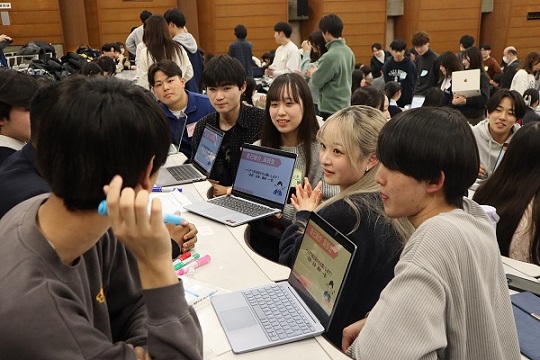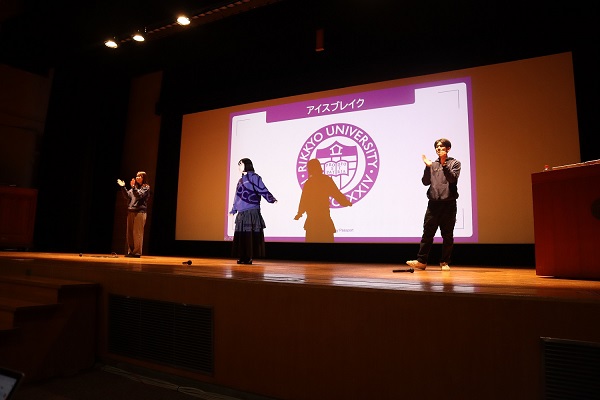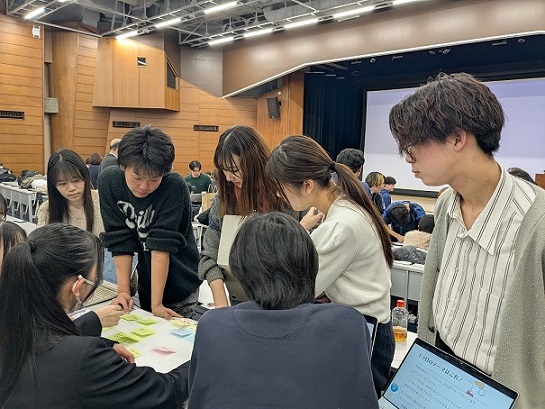Jan 11, 2025
Rikkyo 1-day Passport 2025
OBJECTIVE.
“The Rikkyo College of Business (COB) 1-day Passport 2025” was held on January 11, 2025, at Rikkyo University Ikebukuro campus. The event introduced two concepts: “Class Experience at COB” and “Discover Your Leadership through Group Work”. First-year students led a trial class program for high school students and recent graduates. A total of 350 attendees participated, experiencing COB classes and the campus life atmosphere at Rikkyo University.
What is a 1-Day Passport?

The 1-day Passport is an event organized by COB first-year students to provide a trial class experience for high school students and recent graduates. This program is part of a subject for COB first-year students, “Logical Thinking and Leadership (Business Leadership 1)”. On the event day, university and high school students work together in teams of 3-5 members. Across 14 classes in the BL1 course, university students first learn the foundation of logical thinking and then spend the second half preparing original lesson materials for the 1-day event. During the event, university students take on the role of instructors for high school students, even though they are usually the ones taking classes. This program is designed to deepen their understanding of logical thinking by having them teach what they’ve learned to others.
Features of the 1 Day-Passport
1. Event Operation by Student Staff
The BL1 employs a "Student Staff system," where second-year students serve as Student Assistants (SAs) and Course Assistants (CAs). These Student Staff usually facilitate classes. Since the 1-day event is also part of their course, the Student Staff not only facilitate and assist attendees during the event but also handle most tasks, including behind-the-scenes activities such as staffing and advertising for participation.
2. COB First-Year Students as Instructors
COB first-year students serve as instructors, leading classes for high school students and recent graduates. They prepare engaging lesson materials for the event, receiving feedback from faculty, Student Staff, and senior students. This teaching experience, distinct from attending classes, offers an excellent opportunity for them to develop leadership skills and grow.
The BL1 employs a "Student Staff system," where second-year students serve as Student Assistants (SAs) and Course Assistants (CAs). These Student Staff usually facilitate classes. Since the 1-day event is also part of their course, the Student Staff not only facilitate and assist attendees during the event but also handle most tasks, including behind-the-scenes activities such as staffing and advertising for participation.
2. COB First-Year Students as Instructors
COB first-year students serve as instructors, leading classes for high school students and recent graduates. They prepare engaging lesson materials for the event, receiving feedback from faculty, Student Staff, and senior students. This teaching experience, distinct from attending classes, offers an excellent opportunity for them to develop leadership skills and grow.
Schedule for the 1-Day Passport
The program consists of three sections: Introduction, Class Experience, and Group Review.
1. Introduction: Overview of Rikkyo COB and Leadership

The event began with an opening video created by Student Staff. During the icebreaker, all participants danced together, enjoying a routine prepared by the Student Staff to help high school students relax. Initially, the high school students appeared nervous but soon started to enjoy the activity, becoming lively and engaged.
Next, the Student Staff explained "Rikkyo COB" and "Leadership". The Rikkyo COB defines leadership as "the influence of affecting other team members to achieve team goals". This concept is learned not only in the BL1 course but also throughout the BLP programs.
At the end of this session, everyone set their leadership goals and then moved on to the next session.
Next, the Student Staff explained "Rikkyo COB" and "Leadership". The Rikkyo COB defines leadership as "the influence of affecting other team members to achieve team goals". This concept is learned not only in the BL1 course but also throughout the BLP programs.
At the end of this session, everyone set their leadership goals and then moved on to the next session.
2. Class Experience
The Class Experience is a key part of the event where high school students and graduates gain first-hand insight into the COB. First-year university students deliver in-person lectures using meticulously prepared lesson materials. The high school students tackled various tasks such as, “How can you improve my test scores at school?”, “How can you wake up earlier in the morning?”, and “How can you reduce your smartphone usage?”. They brainstormed solutions on sticky notes and poster paper. The first-year university students put considerable effort not only into preparing material slides but also into explaining the content clearly and creating an engaging atmosphere. Their impressive efforts in leading the class and taking on individual roles were evident throughout the session.
3.Group Review
The COB also emphasizes the importance of reflection activities. By not only learning logical thinking but also reviewing their leadership behaviors during the class experience, students can deepen their understanding of both concepts. Interactive feedback among team members, discussing how and when their leadership behaviors influenced others, helps them assess whether they achieved the goals set at the beginning. Moreover, this process allows them to recognize previously unnoticed strengths, contributing to further personal growth. After completing the program, high school participants commented, "I enjoyed the class because it was a fresh experience—the style of the class was unlike anything I’ve experienced in high school", " My perspective on leadership has changed, and I now feel less intimidated about taking on leadership roles” and “Although I haven’t been good at working with others, I’m glad I enjoyed the group work."
Comment Excerpts from First-Year Students

・Although the 55-minute class felt short, I enjoyed leading it, as the high school students actively shared their opinions and participated enthusiastically.
・I was relieved that the high school students enjoyed working on the contents we had prepared and came up with more ideas than we expected. I’m glad we were able to manage the class smoothly while keeping track of time.
・I was relieved that the high school students enjoyed working on the contents we had prepared and came up with more ideas than we expected. I’m glad we were able to manage the class smoothly while keeping track of time.
Comment from BL1 Course Leader, Visiting Associate Professor Uda
This year as well, a total of 350 high school students from across Japan participated in the 1-day Passport event. First-year students organized the event, preparing lesson materials for high school students over a four-month period starting in September, just as in previous years. Since the university students planned the class operations more meticulously this year, in addition to creating lesson materials, more of them appeared confident in leading their sessions. The satisfaction rate among high school students was also higher than last year’s.
Creating lesson materials requires working in groups outside of class. A survey of first-year students shows that, despite the difficulty of coordinating schedules among teams of 4–5 members, they were able to deepen not only their logical thinking but also gain practical leadership experience through various efforts, such as assigning roles and creating meeting minutes to share information before the next meeting.
I hope they will continue to gain valuable insights and experiences as they take on new challenges toward higher goals.
Creating lesson materials requires working in groups outside of class. A survey of first-year students shows that, despite the difficulty of coordinating schedules among teams of 4–5 members, they were able to deepen not only their logical thinking but also gain practical leadership experience through various efforts, such as assigning roles and creating meeting minutes to share information before the next meeting.
I hope they will continue to gain valuable insights and experiences as they take on new challenges toward higher goals.
